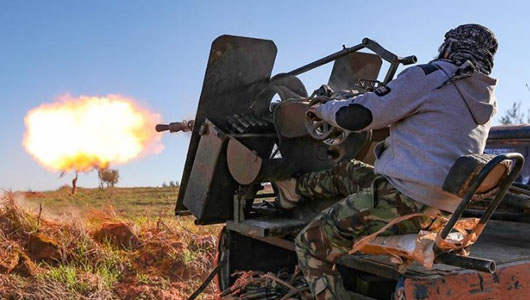Special to WorldTribune.com
Syria’s devastating conflict continues despite the spread of coronavirus and calls by the international community for a ceasefire to stop the fighting which has continued for over nine years and killed more than 500,000 people.
Now, an uneasy calm seems to be setting in as the threat of the COVID-19 pandemic has reached the battlefield and the sprawling refugee camps. Significantly, a new health crisis could be in the offing.
UN Secretary General Antonio Guterres reiterated his plea for a global ceasefire; “The cease-fire call has resonated widely, with endorsements from 114 Governments, regional organizations …. Among them are 16 armed groups.” Specifically, he added, “In Syria, the Idlib cease-fire is holding but we are still hopeful for a country-wide end to hostilities.”

The UN Security Council has been meeting, virtually and through video conferencing links, to address a host of ongoing crises which have not paused for the pandemic. Syria’s bloody crisis is one of them.
Mark Lowcock, the UN’s Humanitarian Chief warned that while coronavirus cases are still relatively small in Syria (43 people), “But if this virus is behaving similarly in Syria to how it has elsewhere, and that is our assumption for now, then tragedy beckons.” He added, “We cannot expect a health care system decimated by almost a decade of war to cope with a crisis that is challenging even the wealthiest nations.”
While facing the uphill challenge of preparing for a wider COVID-19 outbreak, the UN is still tasked with providing humanitarian resources for millions of displaced people inside the country. Under Secretary-General Lowcock added, “In 2019, humanitarian agencies and partners reached an average 6 million people across the country every month; so far this year, food assistance has been delivered to 4.6 million people across the country on average.”
The ongoing conflict has caused 5.6 million Syrians to flee their homeland as refugees while a further 6 million people are internally displaced inside their country by the fighting.
UN Special Envoy for Syria Geir Pederson stressed, “The Syrian government has continued to take increasingly significant steps to combat COVID-19. So have the Syrian Opposition Coalition and other de facto authorities in areas outside the government control.”
Geir Pederson added, “the different ceasefire arrangements between Russia, Turkey and the U.S. in the northeast also continue to broadly hold…but this is an uneasy and fragile calm in both northwest and northeast Syria. And there is the constant risk of escalation in Syria.”
UK Amb. Jonathan Allen told the Council, “Coronavirus knows no borders. It knows no front lines. It is a threat to all in Syria and beyond. Preventing it is a matter of humanity, not of politics. We must ensure that no part of Syria is neglected in the effort to prevent and prepare for the potential spread of the virus.”
Why is this important to us now in the midst of a health pandemic and economic downturn which has crippled Western Europe, the USA and Japan?
Contagion. What would happen if COVID-19 virus were to spread like wildfire throughout Syria and then later into densely crowded refugee camps in neighboring Turkey and Lebanon?
Turkey hosts over three million Syrian refugees. Many could be infected. And let’s not forget that Turkey’s authoritarian leader Recep Tayyip Erdogan has often threatened send or release more refugees into Western Europe repeating the humanitarian tsunami of 2015 when a million Syrians fled into Germany and Sweden.
Right now, the pressure is on Greece where the Athens government has been overwhelmed by the humanitarian burden which could turn into a deluge should the Turks decide to let it so.
Back in March on the cusp of this virus, Erdogan was bullying the European Union to give him additional monetary aid or he will turn the spigot which would first flood into Greece and then Europe’s soft underbelly in the Balkans and then into Central Europe.
The European Union is expanding its support for Syrian refugees and vulnerable persons in Iraq and Lebanon through a new aid package of almost $275 million. The U.S. has pledged an additional $108 million for Syria, bringing the total U.S. humanitarian response to more than $10.6 billion since the start of the Syria crisis.
Stopping COVID-19 contagion among the Syrian refugees has many advantages besides standing on the moral health high ground. The spread of such a disease, as we’ve seen and learned the hard way, cannot be wished away.
We must eradicate the virus; the alternatives could be catastrophic.
John J. Metzler is a United Nations correspondent covering diplomatic and defense issues. He is the author of Divided Dynamism the Diplomacy of Separated Nations: Germany, Korea, China (2014). [See pre-2011 Archives]

 By
By